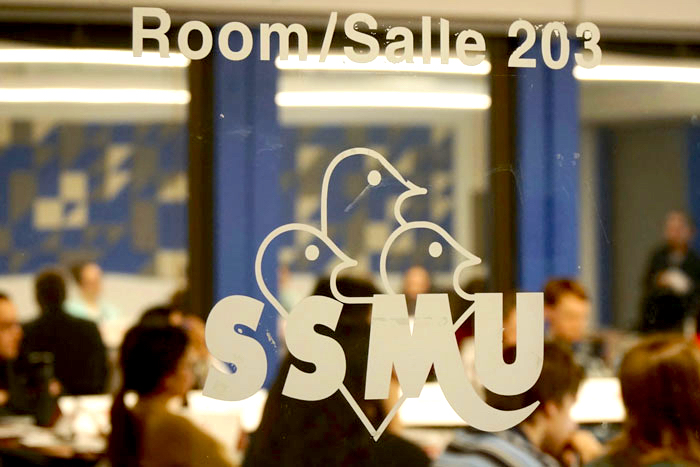The Students’ Society of McGill University (SSMU) held its fifth Legislative Council meeting of the Fall 2020 semester on Nov. 5, where SSMU representatives discussed President Jemark Earle’s five-year plan which aims to further improve the student union. The council also passed two new motions: The first concerned the implementation of an equity triage within SSMU’s Equity Policy, and the second amended the standing rules for the 2020-2021 Legislative Council.
SSMU President Jemark Earle, who campaigned on creating a long-term plan which would allow for the Society to expand their services, introduced his five-year plan to Council for consultation. The proposal hopes to make SSMU’s staff, operations, clubs, services, finance, and advocacy departments more robust and to support their continual growth in the coming years. Earle suggested several ways that SSMU can improve the quality of its services in order to maintain their development over the next few years.
“Executive turnover is extremely high […] and executive teams [act] on impulsive one-year decisions,” Earle said. “[This is] the bane of [the] student union and results in ineffectiveness [….] This plan will create a subcommittee of the Legislative Council, which will include members at large, councillors, directors, executives, and full-time staff, to ensure that it gets carried through from year to year.”
Notable recommendations in the five-year plan include renovations to the SSMU building’s second-floor cafeteria and student bar, strategies to better integrate clubs into campus life, and calls to increase SSMU staffing support by 2026. Earle explained that the goal of the plan was to prioritize services, clubs, and operations and to make the Society’s building a more welcoming hub for student life.
“In three years time, I think we would be able to renovate the [cafeteria] because there is a lot of under-utilized space which could be turned into quite a nice student lounge,” Earle said. “In my opinion, we could also look at getting some food options there, but I think there is a general need for a hangout space on campus.”
After Earle’s presentation, the council moved to approve two motions. Only the motion regarding the implementation of an equity triage process to the Society’s Equity Policy generated debate during the meeting. Moved by Vice-President Student Life Maheen Akter, the motion addresses the long-standing pattern of equity groups facing delays in many of SSMU’s operations. Akter explained that the equity triage process would prioritize marginalized groups when dealing with the society’s operations, communications, IT, human resources, and accounting departments.
“It is absolutely our priority to […] put processes [like this] in place to prioritize equity-seeking groups and to [also] serve all student groups,” Akter said. “As we put these [motions] forward, we are also constantly thinking of ways that we can improve all these systems and […] about why there are backlogs in some areas of our services, and figuring out ways to fix them.”
Moment of the meeting:
During his five-year plan presentation to the Legislative Council, President Earle discussed various initiatives that could garner more student engagement with SSMU, including finishing Gerts’ renovations, bringing back the yearbook, and opening a SSMU tax clinic. Acknowledging it as an ambitious idea, President Earle also put forward the possibility of the Society owning its own therapy dogs as a potential service by 2026 and spoke with great excitement as he described this idea to the council.
Soundbite:
“The fact that we need a triage is not ideal [….] As the President outlined in the generative discussion on the five-year plan, we are understaffed [and] we do have a very limited capacity compared to the services we are trying to offer and the student body that we have to serve. The capacity just isn’t always there to do it in a timely manner. If anything, this amendment is trying to reduce the impact of that lack of capacity on equity-seeking groups that are already disadvantaged in a number of other ways.” – Brooklyn Fizzle, VP University Affairs.







